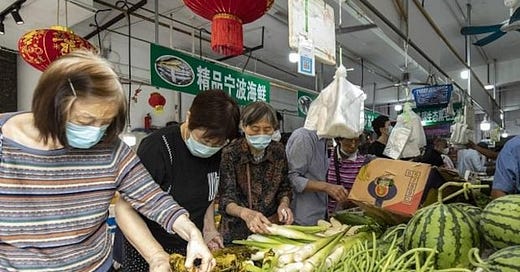China's trade is faltering as demand at home and abroad falls amid rising inflation
Exports increased 7.1% year on year in August, slowing from an 18.0% increase in July, according to official customs data released on Wednesday, well below analysts' expectations of a 12.8% increase.
BEIJING China's exports and imports slowed in August, with growth falling short of expectations as rising inflation hampered overseas demand and new COVID curbs and heatwaves disrupted output, reviving downside risks for the shaky economy.
Exports increased 7.1% year on year in August, slowing from an 18.0% increase in July, according to official customs data released on Wednesday, well below analysts' expectations of a 12.8% increase.
Outbound shipments have outperformed other economic drivers this year, but they are now facing new challenges as global interest rates, inflation, and geopolitical tensions weigh on external demand.
"It appears that export softness arrived earlier than expected, as recent shipping data suggests that demand from the United States and the European Union has already slowed as shipping prices have fallen significantly," said Zhou Hao, chief economist at Guotai Junan International.
He anticipates that pricing effects will continue to disrupt trade, and that real import growth has already turned negative since the late first quarter, implying more headwinds for demand.
The yuan's recent two-year lows have not boosted China's export growth, highlighting the country's weak external demand.
Slower growth is due in part to unfavourable comparisons to strong exports last year, but it is also exacerbated by increased COVID restrictions as infections increased and heatwaves disrupted factory output in southwestern areas.
In early August, the export hub Yiwu imposed a three-day lockdown to contain a COVID outbreak, disrupting local shipments and the delivery of Christmas goods during the peak season.
Imports rose only 0.3% in August, up from 2.3% the previous month, according to customs data, well below the 1.1% increase forecast. Imports and exports both grew at the slowest rate in four months.
Imports were hampered by weak domestic demand, which was hampered by the worst heatwaves in decades, a property crisis, and sluggish consumption.
Global commodity prices fell again in August, albeit at a slower pace.
"The remarkably slower import growth indicated that the sector has faced a wave of headwinds in recent months that is not expected to abate anytime soon," said Bruce Pang, chief economist at Jones Lang Lasalle.
"COVID outbreaks disrupted supply chains and demand, while power rationing harmed output."
The broad dollar strength also puts pressure on imports." This resulted in a smaller trade surplus of $79.39 billion, compared to a $101.26 billion surplus in July, which was a record for any country's single-month goods trade balance in history.
Goldman Sachs analysts expect China's large trade surpluses to continue in the coming years, but they warn that key risks include geopolitical tensions and significantly higher commodity prices in the medium term.
On Monday, Assistant Commerce Minister Li Fei stated that China's foreign trade is being hampered by factors such as weakening external demand.
The central bank announced on Monday that it would reduce the amount of foreign exchange reserves that financial institutions must hold in order to slow the yuan's recent depreciation.
(Source: Reuters)



